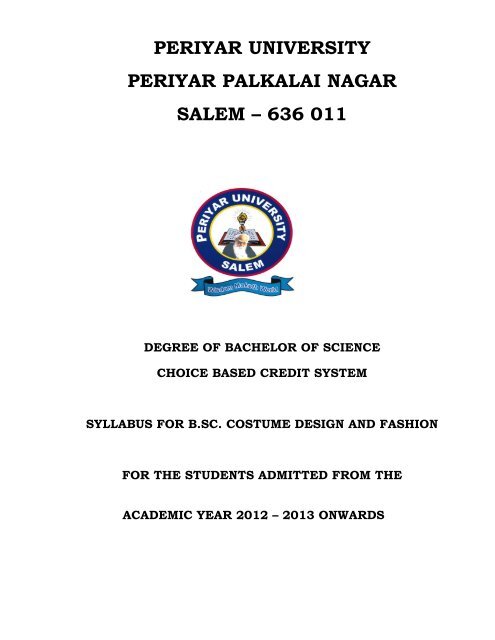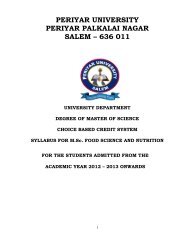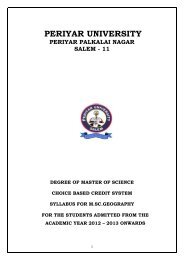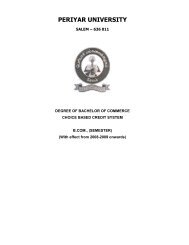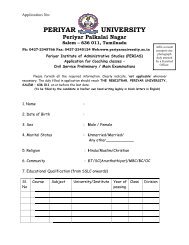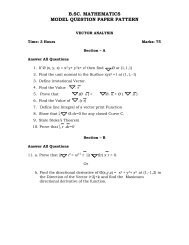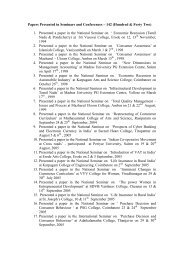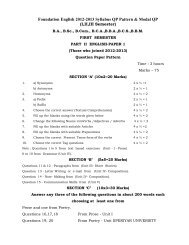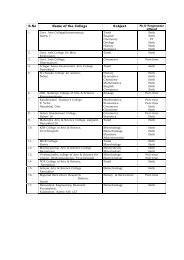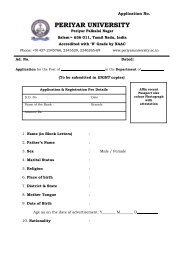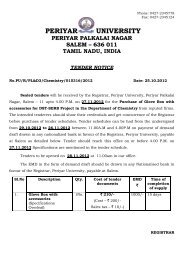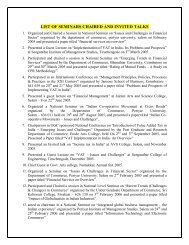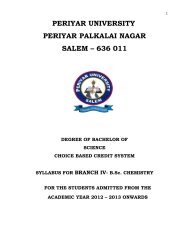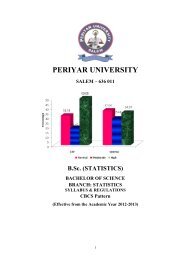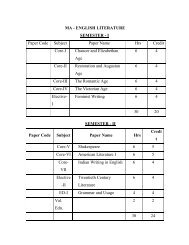B.Sc. Costume Design and Fashion - Periyar University
B.Sc. Costume Design and Fashion - Periyar University
B.Sc. Costume Design and Fashion - Periyar University
You also want an ePaper? Increase the reach of your titles
YUMPU automatically turns print PDFs into web optimized ePapers that Google loves.
PERIYAR UNIVERSITY<br />
PERIYAR PALKALAI NAGAR<br />
SALEM – 636 011<br />
DEGREE OF BACHELOR OF SCIENCE<br />
CHOICE BASED CREDIT SYSTEM<br />
SYLLABUS FOR B.SC. COSTUME DESIGN AND FASHION<br />
FOR THE STUDENTS ADMITTED FROM THE<br />
ACADEMIC YEAR 2012 – 2013 ONWARDS
RULES AND REGULATIONS FOR THE ADMISSION OF 3 YEAR<br />
I. CONDITION FOR ADMISSION<br />
C<strong>and</strong>idates seeking admission to the first year degree of Bachelor of<br />
<strong>Sc</strong>ience in <strong>Costume</strong> <strong>Design</strong> <strong>and</strong> <strong>Fashion</strong> shall be required to have passed in any<br />
higher secondary course examination of the state board/CBSE/ICSE.<br />
Pass in any <strong>Fashion</strong>/ <strong>Costume</strong>/Textile/Apparel related Diploma course<br />
is eligible to admit in direct second year of this UG Course.<br />
II. DURATION OF THE COURSE<br />
The course for the degree of Bachelor Of <strong>Sc</strong>ience <strong>Costume</strong> <strong>Design</strong><br />
<strong>and</strong> <strong>Fashion</strong> shall extend over a period of three academic years - 6 Semesters<br />
<strong>and</strong> each semester normally consisting of 90 working days or 450 Hours.<br />
III. ELIGIBILITY FOR THE DEGREE<br />
A c<strong>and</strong>idate shall be eligible for the degree of Bachelor Of <strong>Sc</strong>ience<br />
<strong>Costume</strong> <strong>Design</strong> And <strong>Fashion</strong>, if he/she has satisfactorily undergone the<br />
prescribed courses of the study for a period not less than 6 semesters in an<br />
institution approved by the university has passed the prescribed<br />
examinations in all the 6 Semesters.<br />
IV.<br />
SUBJECT OF STUDY<br />
The subjects of the study for the B.<strong>Sc</strong>., <strong>Costume</strong> <strong>Design</strong> <strong>and</strong> <strong>Fashion</strong><br />
<strong>and</strong> the syllabus for the subjects are given in the annexure.<br />
V. REQUIREMENT OF EXAMINATION<br />
The theory examinations will be conducted for 3 Hours by the<br />
university in the subjects prescribed for all the semesters in the month of<br />
November & April every year.<br />
The practical examinations will be conducted for 3 Hours by the<br />
university in all the subjects prescribed in the month of March & April.
VI.<br />
SCHEME OF THE EXAMINATION<br />
The scheme of examinations for the course is given in Annexure. All the practical<br />
examinations/ Project work shall be conducted & evaluated internally by the<br />
institution themselves with internal <strong>and</strong> external examiners appointed by the<br />
university.<br />
SEM<br />
I<br />
PART<br />
HRS<br />
MARKS<br />
COURSE<br />
COURSE<br />
CREDIT<br />
TOTA<br />
CODE<br />
L T/P CIA EA<br />
L<br />
I 12UTA01 Tamil I / * 4 2 3 25 75 100<br />
II 12UEN01 English I 4 2 3 25 75 100<br />
12UCD01<br />
Core I – Basic Garment<br />
Construction<br />
3 2 5 25 75 100<br />
Core Prac. I – Basic Garment<br />
12UCDP01<br />
III<br />
Construction Practical<br />
- 3 - - - -<br />
12UCDA01 Allied – I – Fibre to Fabric 3 2 4 25 75 100<br />
12UCDAP01<br />
Allied Prac. I – Computer<br />
Application Practical<br />
- 3 - - - -<br />
IV<br />
12UCDV01 Val.Edu.- Yoga 2 - 2 25 75 100<br />
30 17<br />
II<br />
III<br />
IV<br />
I 12UTA02 Tamil II/* 4 2 3 25 75 100<br />
II 12UEN02 English II 4 2 3 25 75 100<br />
12UCD02 Core II – Sewing Technology 4 2 5 25 75 100<br />
12UCDA02<br />
Allied II – Historic <strong>Costume</strong> &<br />
Textiles<br />
4 2 5 25 75 100<br />
Allied Prac. II - <strong>Fashion</strong> Sketching<br />
12UCDAP02<br />
III<br />
Practical<br />
- 5 3 40 60 100<br />
12UCDP01<br />
Core Prac. I - Basic Garment<br />
Construction Practical<br />
- - 3 40 60 100<br />
12UCDAP01<br />
Allied Prac. I - Computer<br />
Application Practical<br />
- - 3 40 60 100<br />
Env. Stu 1 - 1 25 75 100<br />
IV<br />
30 26<br />
I 12UTA03 Tamil III/* 4 2 3 25 75 100<br />
II 12U EN03 English III 4 2 3 25 75 100<br />
12UCD03 Core - III – Pattern Making 4 2 4 25 75 100<br />
Core Prac. II – <strong>Design</strong>ing &<br />
III<br />
12UCDP02 Manufacturing Children’s Apparel - 3 - - - -<br />
Practical<br />
12UCDA03<br />
Allied III – <strong>Fashion</strong> & Clothing<br />
Psychology<br />
3 2 4 25 75 100<br />
12UCDSP01<br />
SBEC – I – Surface Embellishment<br />
Practical<br />
1 1 2 40 60 100<br />
IV<br />
NMEC – I<br />
12UCDN01 (Other Department NMEC Paper –I 1 1 2 25 75 100<br />
)<br />
30 18<br />
I 12UTA04 Tamil IV/* 4 2 3 25 75 100<br />
II 12UEN04 English IV 4 2 3 25 75 100<br />
12UCDP03<br />
Core Prac. III – Embroidery &<br />
Surface Decoration Practical<br />
- 3 3 40 60 100<br />
12UCDP04<br />
Core Prac. IV – Textile Testing<br />
Practical<br />
- 3 3 40 60 100<br />
Allied – IV – Textile Processing &<br />
12UCDA04<br />
III<br />
Testing<br />
4 1 4 25 75 100<br />
12UCDAP03<br />
Allied Prac. III – Textile<br />
Processing Practical<br />
- 3 3 40 60 100<br />
Core Prac. II - <strong>Design</strong>ing &<br />
12UCDP02 Manufacturing Children’s Apparel - - 3 40 60 100<br />
Practical
IV<br />
12UCDN02<br />
12UCDS01<br />
NMEC – II<br />
(Other Department NMEC Paper –<br />
II )<br />
SBEC – II – Non Woven &<br />
Technical Textiles<br />
1 1 2 25 75 100<br />
1 1 2 25 75 100<br />
V<br />
VI<br />
30 26<br />
III 12UCD04 Core – IV – Clothing Care 4 2 5 25 75 100<br />
III 12UCD05<br />
Core – V – Apparel Quality<br />
Assurance<br />
4 2 5 25 75 100<br />
III 12UCD06 Core – VI – Garment Finishing 4 2 5 25 75 100<br />
Core Prac. V – <strong>Design</strong>ing &<br />
III 12UCDP05 Manufacturing Women’s Apparel - 3 - - - -<br />
Practical<br />
III 12UCDM01<br />
MBEC – I – <strong>Fashion</strong> Marketing &<br />
Merch<strong>and</strong>ising<br />
5 - 4 25 75 100<br />
IV 12UCDSP02<br />
SBEC – III – <strong>Fashion</strong> Accessories<br />
& Ornaments Practical<br />
1 1 2 40 60 100<br />
IV<br />
12UCDSP03 SBEC – IV – Beauty Care Practical 1 1 2 40 60 100<br />
30 23<br />
III 12UCD07<br />
Core – VII- CAD in Textile &<br />
<strong>Fashion</strong><br />
4 2 5 25 75 100<br />
III 12UCDP06<br />
Core Prac. VI – CAD in Textiles &<br />
<strong>Fashion</strong> Practical<br />
- 3 3 40 60 100<br />
Core Prac. VII – <strong>Design</strong>ing &<br />
III 12UCDP07 Manufacturing Men’s Apparel - 3 3 40 60 100<br />
Practical<br />
III 12UCDM02 MBEC – II – <strong>Fashion</strong> Photography 3 2 4 25 75 100<br />
III 12UCDM03<br />
MBEC – III – Textile Garment<br />
Industry Management<br />
3 2 4 25 75 100<br />
12UCDSP04<br />
SBEC – V – Portfolio Presentation<br />
Practical<br />
1 1 2 40 60 100<br />
SBEC – VI - Needle Craft<br />
12UCDSP05<br />
1 1 2 40 60 100<br />
Practical<br />
IV<br />
12UCDP08 Project Viva Voce 2 2 3 - 100 100<br />
Core Prac. – V - <strong>Design</strong>ing &<br />
12UCDP05 Manufacturing Women’s Apparel - - 3 40 60 100<br />
Practical<br />
V<br />
Extn. Activities - - 1 - 100 100<br />
30 30<br />
TOTAL 140<br />
* - Any other language Courses<br />
SBEC - Skill Based Elective Courses<br />
NMEC - Non – Major Elective Courses<br />
MBEC - Major Based Elective Course<br />
VII. PASSING RULES<br />
Theory Subjects<br />
75% of the marks for external evaluation <strong>and</strong> 25% marks are allotted<br />
for internal evaluation.
C<strong>and</strong>idate is dem<strong>and</strong> to have passed to a subject, if he/she get a<br />
minimum of 40% of total marks in theory subjects with internal mark of 10<br />
marks <strong>and</strong> external marks of 30 marks.<br />
Practical/Project<br />
60% of the marks for external evaluation <strong>and</strong> 40% marks are allotted<br />
for internal evaluation.<br />
For practical subjects, the c<strong>and</strong>idate should get minimum marks of 24<br />
marks in external evaluation out of 60 <strong>and</strong> 16 marks in internal evaluation<br />
out of 40.<br />
For project work <strong>and</strong> viva voce a c<strong>and</strong>idate should get minimum of 40<br />
marks out of 100.<br />
a. THEORY:<br />
Time: 3Hours<br />
QUESTION PAPER PATTERN<br />
Total Marks: 75 Marks<br />
QUESTION PAPER PATTERN<br />
Unit Section-A Section-B Section-C<br />
I Q. 1, 2 Q. 11a, 11b, Q. 16<br />
II Q. 3, 4 Q. 12a, 12b Q.17<br />
III Q. 5, 6 Q.13a, 13b Q.18<br />
IV Q. 7, 8 Q.14a, 14b Q.19<br />
V Q. 9, 10 Q.15a, 15b Q.20<br />
SECTION A (10 X2 = 20)<br />
ANSWER ALL THE QUESTIONS<br />
SECTION B (5 X5 = 25)<br />
Either or Choice<br />
ANSWER ALL THE QUESTIONS<br />
SECTION C (3 X10 = 30)<br />
ANSWER ANY THREE QUESTIONS OUT OF FIVE<br />
INTERNAL ASSESSMENT<br />
MARKS<br />
TEST : 15<br />
ASSIGNMENT : 5<br />
ATTENDANCE : 5<br />
25<br />
PASSING MINIMUM (IA) 40%<br />
PASSING MINIMUM (UE) 40%<br />
PASSING MINIMUM TOTAL<br />
- 10 MARKS<br />
- 30 MARKS<br />
- 40 MARKS
. PRACTICAL:<br />
Time: 3Hours<br />
INTERNAL MARKS:<br />
Total Marks: 60 Marks<br />
SECTION A (1 X20= 20)<br />
Either or Choice<br />
ANSWER ANY ONE<br />
SECTION B (1 X40 = 40)<br />
Either or Choice<br />
ANSWER ANY ONE<br />
RECORD: 25<br />
SAMPLES: 10<br />
ATTENDANCE : 05<br />
TOTAL: 40<br />
PASSING MINIMUM (IA) 40%<br />
PASSING MINIMUM (UE) 60%<br />
PASSING MINIMUM TOTAL<br />
- 16 MARKS<br />
- 24 MARKS<br />
- 40 MARKS<br />
B.<strong>Sc</strong>. COSTUME DESIGN AND FASHION<br />
CHOICE BASED CREDIT SYSTEM<br />
(for the students admitted from the year 2012-2013 onwards)<br />
I. LIST OF CORE COURSES<br />
1. 12UCD01 - Basic Garment Construction<br />
2. 12UCDP01 - Basic Garment Construction Practical<br />
3. 12UCD02 - Sewing Technology<br />
4. 12UCD03 - Pattern Making<br />
5. 12UCDP02 - <strong>Design</strong>ing <strong>and</strong> Manufacturing Children’s Apparel Practical<br />
6. 12UCDP03 - Embroidery <strong>and</strong> Surface Decoration practical<br />
7. 12UCDP04 - Textile Testing Practical<br />
8. 12UCD04 - Clothing Care<br />
9. 12UCD05 - Apparel Quality Assurance<br />
10. 12UCDP05 - <strong>Design</strong>ing <strong>and</strong> Manufacturing Women’s Apparel Practical
11. 12UCD06 - Garment Finishing<br />
12. 12UCD07 - CAD in Textile <strong>and</strong> <strong>Fashion</strong><br />
13. 12UCDP06 - CAD in Textile <strong>and</strong> <strong>Fashion</strong> Practical.<br />
14. 12UCDP07 - <strong>Design</strong>ing <strong>and</strong> Manufacturing Men’s Apparel Practical.<br />
II. LIST OF ALLIED COURSES<br />
1. 12UCDA01 - Fibre to Fabric<br />
2. 12UCDAP01 - Computer Application Practical<br />
3. 12UCDA02 - Historic <strong>Costume</strong>s <strong>and</strong> Textiles<br />
4. 12UCDAP02 - <strong>Fashion</strong> Sketching Practical<br />
5. 12UCDA03 - <strong>Fashion</strong> <strong>and</strong> Clothing Psychology<br />
6. 12UCDA04 - Textile Processing & Testing<br />
7. 12UCDAP03 - Textile Processing Practical<br />
III. LIST OF SKILLED BASED ELECTIVE COURSES<br />
1. 12UCDSP01 - Surface Embellishment Practical<br />
2. 12UCDS01 - Non-Woven <strong>and</strong> Technical Textiles<br />
3. 12UCDSP02 - <strong>Fashion</strong> Accessories <strong>and</strong> Ornaments Practical<br />
4. 12UCDSP03 - Beauty Care Practical<br />
5. 12UCDSP04 - Port Folio Presentation Practical<br />
6. 12UCDSP05 - Needle Craft Practical<br />
IV. LIST OF MAJOR BASED ELECTIVE COURSES<br />
1. 12UCDM01 - <strong>Fashion</strong> Marketing & Merch<strong>and</strong>ising<br />
2. 12UCDM02 - <strong>Fashion</strong> Photography
3. 12UCDM03 - Textile <strong>and</strong> Garment Industry Management<br />
V. LIST OF NON - MAJOR ELECTIVE COURSE<br />
1. 12UCDN01 - Beauty & Body Care<br />
2. 12UCDN02 - Concepts of <strong>Fashion</strong><br />
B.<strong>Sc</strong>. COSTUME DESIGN AND FASHION<br />
CHOICE BASED CREDIT SYSTEM<br />
12UCD01 BASIC GARMENT CONSTRUCTION<br />
UNIT – I<br />
Parts <strong>and</strong> function of a single needle machine, essential equipment. Seams-<strong>and</strong> Seam<br />
finishes – types, working of seams <strong>and</strong> seam finishes. Hemming - Importance, types, hem<br />
stitches used.<br />
UNIT – II<br />
Fullness - Definition, types, darts, tucks, Pleats, flares, godets, gathers <strong>and</strong> shirrs,<br />
frills, flounces. Facing <strong>and</strong> binding – Definition & types.<br />
UNIT – III<br />
Openings–Plackets–Definition, Characteristics of a good Placket – type, method of<br />
constructing the plackets.<br />
UNIT – IV<br />
Closures: Fasteners–Conspicuous–Definition, types Button <strong>and</strong> button holes, button loops,<br />
button with holes, shank buttons, eyelets of words Inconspicuous – press buttons, hook, <strong>and</strong><br />
eyes, zips.
UNIT – V<br />
Sleeves: Definition, Types of Sleeves – plain, puff sleeve, bishop sleeve, bell, circular,<br />
squared armhole, cap sleeve <strong>and</strong> Magyar sleeve, sleeve <strong>and</strong> bodice combined – raglan, kimono<br />
<strong>and</strong> dolman.<br />
Yoke's - Types, simple yoke, Yoke with fullness, within the yoke.<br />
REFERENCE<br />
‣ The Complete Book of sewing – Dorling Kindersley Ltd, London 1986.<br />
‣ Practical clothing construction – Part I & II,Cosmic Press, Chennai (1986)<br />
‣ Securing & knitting - A readers Digest, step – by – step guide, Readers Digest Pvt<br />
Ltd., Australia.<br />
12UCDP01 BASIC GARMENT CONSTRUCTION PRACTICAL<br />
1. Preparation of Samples for Seam & Seam Finishes.<br />
2. Preparation of Samples for Fullness<br />
3. Preparation of 2 Samples for Facings & bindings<br />
4. Preparation of 2 Samples for Plackets & fasteners<br />
5. Preparation of 2 Samples for Sleeves<br />
6. Preparation of 2 Samples for Collars<br />
7. Preparation of 2 Samples for yokes.
12UCD02 SEWING TECHNOLOGY<br />
UNIT-I<br />
Sewing -Introduction, History of sewing machine, innovators of sewing system.<br />
UNIT-II<br />
Sewing machines -Types of sewing machines, parts <strong>and</strong> functions of single <strong>and</strong> double<br />
needle machine, Over lock machine, flat lock machine buttonhole machine, button fixing<br />
machine & Bar tacking machine, attachments used in sewing machine, Trends in sewing<br />
machines.<br />
UNIT-III<br />
Sewing machineries-care <strong>and</strong> maintenance – types of maintenance, common problems<br />
<strong>and</strong> remedies.<br />
UNIT –IV<br />
Clothing construction tools–cutting tools, measuring tools, marking tools, pressing tools,<br />
types of papers, types of needles, types of spread, spreading equipment, methods.<br />
UNIT-V<br />
Sewing techniques-types of machine stitching, importance, basic h<strong>and</strong> stitches, Sewing<br />
threads-importance, Selection, Characteristics Manufacturing process, twisting process.
REFERENCES<br />
‣ Introduction to clothing manufacture Gerry cooklin Blackwell science uk, 1991.<br />
‣ The Technology of clothing manufacture, Harold Carr <strong>and</strong> Barbara Latham, Oxford<br />
Pub, USA, 1994.<br />
‣ A Complete Guide for sewing – coles M Sew, Heinemann Professional Publishing,<br />
Singapore.<br />
‣ Reader's Digest sewing Guide, Complete Guide to sewing, 13th Edition, the Reader's<br />
Digest Association Inc, pleasant ville.<br />
12UCD03 PATTERN MAKING<br />
UNIT-I<br />
Body measurements,-Importance-Preparing for measuring-measurements for ladies, mens,<br />
boys & girls. St<strong>and</strong>ardizing body measurements-Importance-techniques used.<br />
UNIT-II<br />
Pattern making – methods (Drafting & Draping), merits & Demerits, Types of paper patterns,<br />
principles of pattern Drafting – Drafting basic bodice front, back & Sleeve Draping – steps in draping<br />
a basic bodice front, back & sleeve.<br />
UNIT-III<br />
Fitting-principles of fitting, st<strong>and</strong>ards for a good fit, Step in fitting techniques. Checking fit<br />
of a blouse, solving fitting problems in a blouse.<br />
UNIT-IV<br />
Pattern layout – Definition – Rules in layout, methods of layout, layouts for lengthwise<br />
stripped designs, bold designs asymmetric designs, one way designs, Alternative techniques if cloth<br />
is insufficient, fabric cutting, transferring pattern markings.<br />
UNIT-V<br />
Pattern alteration – importance of altering patterns, principles for patter alteration, common<br />
pattern alterations in a blouse. Pattern grading – Definition – types - methods
REFERENCES<br />
‣ Practical clothing construction - Part I & II, Mary Mathews, cosmic press, Chennai, 1986.<br />
‣ Zarapkar system of cutting – Zarapkar K.R., Navneeth's Publications Ltd.,<br />
‣ Pattern grading for women's clothes, the technology of sizing – Gerry cooklin, Black well science<br />
Ltd.,<br />
‣ Metric Pattern cutting, wintered Aldrich, Blackwell science, Uk.<br />
12UCDP02 DESIGNING AND MANUFACTURING CHILDREN'S APPAREL PRACTICAL<br />
<strong>Design</strong>ing, drafting <strong>and</strong> constructing the following garments with the design features.<br />
1. BIB – Variation in outline shape<br />
2. Panty – Plain <strong>and</strong> variation in shapes<br />
3. Jabla – with or without sleeve, with <strong>and</strong> without opening.<br />
4. Knickers - with elastic opening <strong>and</strong> side pickles.<br />
5. Baba suit /Romper – knickers with chest piece attached<br />
6. A line frock– double pointed dart, facings at neckline <strong>and</strong> a armhole.<br />
7. Summer frock – without sleeve <strong>and</strong> collars, suspenders tied at shoulder<br />
8. Yoke frock – with yoke, with sleeve, Gathered, flared, with or without collar.<br />
9. Boy's shirt – open collar, pocket<br />
10. Boy's short – fly open with buttons, side pocket, pleats <strong>and</strong> dart.
REFERENCES<br />
‣ Zarapker system of cutting – Zarapker K.R. Navneet Publications Ltd.<br />
‣ Practical clothing construction – part I <strong>and</strong> II, Mary Mathews, cosmic Press, Chennai (1986).<br />
‣ Practical cutting <strong>and</strong> Tailoring part II Eshwasri Anwahi, Lakhraj Hans R.B Publications, Delhi.<br />
12UCDP03 EMBROIDERY & SURFACE DECORATIONS PRACTICAL<br />
Make the Samples for the following<br />
1. H<strong>and</strong> Embroidery – 15 stitches<br />
2. Machine Embroidery - 3 stitches<br />
3. Appliqué (Any 1 type )<br />
4. Smocking – Types of smocking (Any 1 type )<br />
5. Bead work (Any 1 type )<br />
6. Sequins work (Any 1 type )<br />
7. Zardosi work (Any 1 type )<br />
8. Mirror work (Any 1 type )<br />
9. Stone work (Any 1 type)
12UCDP04 TEXTILE TESTING PRACTICAL<br />
1. Fibre testing - Identification of fibers by microscopic test, burning test <strong>and</strong> solubility test.<br />
2. Yarn testing – Determination of Yarn count, yarn twist, Lea strength & CSP Calculation.<br />
3. Fabric Testing – Fabric Particulars – Threads/inch, yarn crimp, yarn count, cover weight per<br />
square yard of the fabric, Fabric tensile strength, bursting strength, stiffness, drapability,<br />
Shrinkage, Abrasion testing, pilling resistance.<br />
12UCD04 CLOTHING CARE<br />
UNIT – I<br />
Water – hard <strong>and</strong> soft water, methods of softening water. Laundry soaps–manufacture of soap,<br />
composition of soap, Properties of soap, types of soap, soapless detergents, detergent, Manufacture,<br />
merits <strong>and</strong> demerits, of detergent.<br />
UNIT –II<br />
Laundry equipment–for storage, steeping <strong>and</strong> washing, Types of equipments–wash board,<br />
suction washer, wash boiler, washing machine, Drying equipments–out door <strong>and</strong> indoor types. Irons <strong>and</strong><br />
ironing board – Types of Iron, ironing board – types.<br />
UNIT–III<br />
Stiffening agents-starch <strong>and</strong> other stiffening agents, preparation of starch. Bleaching agents-<br />
Types of Bleaching agents, Grease Removers-Grease solvents-Grease Absorbents. Laundry blues <strong>and</strong><br />
their application-optical blues.<br />
UNIT – IV
Laundering & their principles - Principles of washing, kneading <strong>and</strong> squeezing. Methods of<br />
finishing - Damping, ironing, pressing steaming, care & cleaning of irons. Laundering of different fabricscotton<br />
<strong>and</strong> Linen, woolens, colored fabrics, silks, rayon.<br />
UNIT – V<br />
Dry cleaning-Definition <strong>and</strong> its types, stain Removal-classification into Animals, vegetables,<br />
Grease, Dye & Mineral stains-scroch <strong>and</strong> Grass stains-General rules <strong>and</strong> ways of stain removal.<br />
REFERENCES<br />
‣ Textile Fabrics <strong>and</strong> their selection, Wingate I.B. Allied publishers Pvt. Ltd.,<br />
Chennai.<br />
‣ Fundamental of Textiles <strong>and</strong> their care, Dantyagi. S. Orient Longman Ltd., New Delhi,<br />
1980.<br />
‣ Family clothing Tate of Gleasson John wiky <strong>and</strong> Sons, Inc Illinois Latested<br />
‣ Household Textiles <strong>and</strong> laundrywork, Durga Deulkar, Alma Ram <strong>and</strong><br />
Sons New Delhi.<br />
12UCD05 APPAREL QUALITY ASSURANCE<br />
UNIT–I<br />
Define Quality, QC, QA. Importance of quality <strong>and</strong> quality control. Raw material inspection -<br />
fabric inspection - 4 point system - 10 point system - in process inspection - final inspection - no<br />
inspection- 100% inspection - statistical sampling-AQL st<strong>and</strong>ards, preparing specifications.<br />
UNIT- II<br />
Fabric defects - pre sewing defects - sewing defects - post sewing defects-causes &<br />
remedies. Minor <strong>and</strong> major defects.<br />
UNIT-III<br />
concepts.<br />
Concepts of Total quality management - tools used. ISO 9000 - ISO 14000 - SA 8000 - Ecotex
UNIT-IV<br />
Accessories testing - sewing threads, button, elastics, lining, interlining, hook, laces, elastics,<br />
packing materials. Testing on dimensional stability - bow-skew ness-shrinkage.<br />
UNIT-V<br />
Apparel Quality Assurance in Packing –importance –types. warehousing –scope & importance –<br />
shipping procedure.<br />
REFERENCES<br />
‣ Managing quality in the apparel industries - Pradip metha, Satish k. Bhardwaj, NIFT,<br />
New age international (p) ltdpublishers, ND.<br />
‣ Technology of clothing manufacture, Harold Carr <strong>and</strong> Barbara Latham, Oxford<br />
publications, ITSA.<br />
‣ Apparel manufacturing <strong>and</strong> sewing product analysis, Ruth EC.<br />
‣ Introduction to quality control, Pradip V Metha,ASCQ quality press,newyork,1992.<br />
‣ Total quality management -a practical approach, Wiley Eastern, New York 1990.<br />
12UCDP05 DESIGNING AND MANUFACTURING WOMEN'S APPAREL PRACTICAL<br />
<strong>Design</strong>ing, Drafting <strong>and</strong> Constructing the following garments for the features.<br />
1. Middy – Variation in panel,<br />
2. Middy Top – Front open, with or without collar <strong>and</strong><br />
variation in sleeves.<br />
3. Night dress - With or without yoke, variation is Sleeves,<br />
attaching trimmings.<br />
4. Maxi - <strong>Fashion</strong>ed neck <strong>and</strong> attaching trimmings.<br />
5. Salwar - Gathered waist with tape or elastic, bottom<br />
design variation.
6. Kemeez - <strong>Fashion</strong>ed neck, variation in sleeve.<br />
7. Ladies pant - Variations in bottom zip attached, patch pants.<br />
8. Ladies shirt - Half open collar Attached, half or full<br />
sleeve.<br />
REFERENCES<br />
‣ Easy cutting - Juvekar,, Commercial Tailors Corporation Pvt. Ltd, 166 Dr.Ambedkar Road,<br />
Delhi.<br />
‣ Zarapker system of cutting – K.P. Zarapker, Navneet Publications Ltd.<br />
‣ Practical clothing construction – part I <strong>and</strong> II, Mary Mathews, cosmic Press, Chennai.
12UCD07 CAD IN TEXTILE AND FASHION<br />
UNIT-I<br />
Introduction to computers – organization of computers – input unit –output unit – central<br />
processing unit – memory device. Working principles of printer- scanner- digitizer – plotters.<br />
UNIT-II<br />
Computer applications in printing – colour reduction – screen preparation – simulation<br />
techniques. Computer application in weaving – stripes – checks – spot designs – enlarged designs –<br />
dobby – jacquard – simulation techniques.<br />
UNIT-III<br />
Computer application in fashion designing – design creation- theme rendering – 3D modeling –<br />
body scanning – texture mapping – design studio – fashion studio – fashion multimedia concepts.<br />
UNIT-IV<br />
– duplicating.<br />
Computer application in pattern making– grading – marker planning – laying – cutting – labeling<br />
UNIT-V<br />
Study of Computer Aided Manufacturing-Computer Integrated Manufacturing-Computerized<br />
Embroidery- Brief study on design software used in industries.<br />
REFERENCES<br />
‣ CAD/CAM computer aided design <strong>and</strong> manufacture, Groover MP <strong>and</strong> E.W.Zinimmers,<br />
prentic hall, India 1984.<br />
‣ Computer aided design <strong>and</strong> manufacture, Bezant C.E, Ellis Horwood, Engl<strong>and</strong>,1983.<br />
‣ CAD in clothing <strong>and</strong> textiles, Winfred Aldrich, Blackwel science, 1994.<br />
‣ Computers in fashion industry, Taylor P, Heinemann publications 1990.<br />
‣ Automation in the textile industry from fibers to apparels, Buhanan <strong>and</strong> Graddy, The<br />
Textile Institute,UK 1995.<br />
‣ Computer aided drafting <strong>and</strong> design –concept <strong>and</strong> application, Veinsinet DO, 1987.
12UCD06 GARMENT FINISHING<br />
UNIT – I<br />
Finishing – types of finishing – importance of garment finishing, advantages of finishing.<br />
UNIT – II<br />
Resin finish – process <strong>and</strong> Recipe, wash <strong>and</strong> wear finish, water proof finish – process <strong>and</strong><br />
Recipe, Water repellent finish – process <strong>and</strong> recipe, antimicrobial finish, flame retardant finish – process<br />
<strong>and</strong> recipe, soil release. Finish – process <strong>and</strong> recipe.<br />
UNIT – III<br />
Stiff finish – process <strong>and</strong> Recipe, softening – silicon finish – process <strong>and</strong> Recipe, Denim finish –<br />
process <strong>and</strong> recipe, Stone wash finish – process, anti – pilling finish – process <strong>and</strong> recipe, Anti mildew<br />
finish – process <strong>and</strong> Recipe.<br />
UNIT – IV<br />
Fusing – Requirement of fusing – types <strong>and</strong> method of fusing, welding <strong>and</strong> adhesives,<br />
moulding. Durable press finish – pressing – methods of pressing – pleating – permanent press.<br />
UNIT – V<br />
Enzyme Finish – classification – working procedures.<br />
REFERENCE<br />
‣ Technology of clothing manufacture – Harold carr of Barbara Latham<br />
‣ Textile finishing – Dr.G.Nallangilli &Dr. S.Jayaprakasam.<br />
‣ Fusing fabric – Margaret Beal 2005, Bt Bate fool Ltd.
12UCDP06 CAD IN TEXTILE AND FASHION PRACTICAL<br />
Coral Draw or fashion Studio<br />
1. <strong>Design</strong> a garment for children - any 3 designs<br />
2. <strong>Design</strong> a garment for women - any 3 designs<br />
3. <strong>Design</strong> a garment for men - any 3 designs<br />
TUKA CAD<br />
1. Create a pattern, grade <strong>and</strong> prepare a marker plan for children – Bib,<br />
Summer Frock, Romper<br />
2. Create a pattern, grade <strong>and</strong> prepare a marker plan for women –<br />
Salvar kameez, middi & middi top, maxi<br />
3. Create a pattern, grade <strong>and</strong> prepare a marker plan for men-<br />
Full sleeve shirt, Kalidhar Kurtha, Pyjama<br />
Adobe Photoshop<br />
1. Converting black & white images into multi colour images<br />
2. Create visiting card with Image mixing
12UCDP07 DESIGNING AND MANUFACTURING MEN'S APPAREL PRATICAL<br />
<strong>Design</strong>ing, Drafting <strong>and</strong> Constructing the following garments for the features.<br />
1. Slack Shirt - with collar, half Sleeve, Patch pocket.<br />
2. Full sleeve shirt - Full open collar, patch pocket, full sleeve<br />
with cuff.<br />
3. S.B. Vest - With / without collar, No sleeve, Fancy<br />
button attached.<br />
4. Pleated Trouser - Pleat in front, Darts at back, side pocket, fly<br />
with button /zip, Belt with adjustable strap.<br />
5. Kalidhar kurtha - Kali piece, side pocket, round necks, half<br />
open.<br />
6. Pyjama - Waist, elastic – tape attached, fly.<br />
REFERENCES<br />
‣ Commercial system of cutting – Juvekar, commercial Tailors corporation Pvt. ltd, 166,<br />
Dr. Ambedkar Road, Dadas.<br />
‣ Practical clothing construction – part I <strong>and</strong> II, Mary Mathews, cosmic press, Chennai.<br />
‣ Zarapkar system of cutting K,. R.Zarapker, Navneet publications Ltd.<br />
‣ Dress making - Smt Thangam Subramaniam, Bombay tailoring <strong>and</strong> Embroidery College,<br />
32 North Part Street, Ambattur, Chennai.<br />
‣ Easy Cutting Juvekar, Commercial Tailors corporation Pvt.Ltd, 166, Dr, Ambedkar road,<br />
Dadas.
12UCDA01 FIBRE TO FABRIC<br />
UNIT-I<br />
Introduction to Textile fibers - Definition, Classification of fibers - Essential <strong>and</strong> desirable<br />
Properties – Natural fibers- cotton, silk, wool, manufacturing, physical <strong>and</strong> chemical properties <strong>and</strong> end<br />
uses.<br />
UNIT-II<br />
Manmade fibers – Viscose rayon, Polyester, manufacturing, physical <strong>and</strong> chemical properties<br />
<strong>and</strong> end uses. Brief study of sp<strong>and</strong>ex / Lycra <strong>and</strong> new fibres.<br />
UNIT- III<br />
Introduction to Ginning – Objects – Types of Ginning, Working principle of knife roller gin.<br />
Working principle of Blow room process – objects of mixing, objects of blow room.<br />
UNIT – IV<br />
Carding – objects, working principles of modern carding. Draw frame – Objects, working<br />
principles of draw frame. Simplex – Objects, working Principles, Spinning (Ring frame) –<br />
Objects, Working Principles.<br />
UNIT – V<br />
Yarn – Definition, Classification, simple, fancy <strong>and</strong> sewing threads.<br />
Fabric - Introduction about weaving & Knitting. Working principle of shuttle loom & weft<br />
knitting machine.<br />
REFERENCES<br />
‣ Textiles fiber to fabric, Corbman B.P, International Mc Graw – Hill, Editions, 1983.<br />
‣ Textile <strong>Sc</strong>ience, E.P.G. Gohl & L.D. Vilensky, 2 nd edition, CBS Publishers <strong>and</strong><br />
Distributors, New Delhi – 110002 (India)<br />
‣ Technology of spinning, W.D. Klein, Textile Institute, Manchester.
‣ Spun yarn Technology, Vol-I, II & III, Dr. Venkatasubramani,<br />
‣ Spun yarn Technology, Eric Oxtoby, Butter worth pub, U.K. 1987.<br />
12UCDAP01 COMPUTER APPLICATION PRACTICAL<br />
UNIT-I<br />
Introduction to Computer – Dos System, Windows, <strong>and</strong> Functions of Photo paint.<br />
UNIT-II<br />
Word processing – Excel processing - Power Point.<br />
UNIT-III<br />
Access Processing, Internet – Browsing – E-mail.<br />
UNIT-IV<br />
UNIT-V<br />
Coral draw –Tools for Garment <strong>Design</strong>ing<br />
Photoshop- Tools, garment styling, colouring <strong>and</strong> designing.<br />
12UCDAP02 FASHION SKECTCHING PRACTICAL<br />
1. Sketch different types of colour theory.<br />
2. Sketching of different action croques.<br />
3. Wardrobe Collection for Teenage boys <strong>and</strong> girls.<br />
4. Head theory – 8 ½ , 10 ½ , <strong>and</strong> 12 ½<br />
- Stick figure<br />
- Block Figure<br />
- Flesh Figure<br />
5. Lay figure.<br />
7. Difference between normal & fashion figure.
12UCDA02 HISTORIC COSTUMES & TEXTILES<br />
UNIT-I<br />
Beginning of costume, growth of dress out of painting, cutting <strong>and</strong> tattooing. <strong>Costume</strong> of India,<br />
traditional costumes of different states of India-Tamilnadu, Rajasthan, factors influencing costume<br />
changes Accessories <strong>and</strong> ornaments used in India.<br />
UNIT-II<br />
<strong>Costume</strong> of ancient civilization – Egypt, Greece. <strong>Costume</strong>s of Far eastern countries –<br />
Pakistan, Srilanka, China, Japan.<br />
UNIT-III<br />
American costume, from 18 th to 20 th<br />
century.<br />
UNIT-IV<br />
French costume during 1500-1600 century.<br />
UNIT-V<br />
Study of the woven textiles with design, colour <strong>and</strong> weaving technique.<br />
Kalamkari.<br />
(a) Dacca muslin, Jam dani, Ch<strong>and</strong>eri, Kashmir shawls <strong>and</strong> Himrus & Amrus. B<strong>and</strong>hani,<br />
(b) Indian dyeing & printing techniques.<br />
REFERENCES<br />
‣ Historic costume, Losla K.T., Chas A bernd & Co, Inc. Illinois 1961.<br />
‣ <strong>Costume</strong>s of Indian <strong>and</strong> Paksitan, DAS S.N., D.S Taraporevala sons & co, Mumbai 1958.<br />
‣ <strong>Costume</strong>s of India, Dorris Flyn, Oxford & I BHPublishing co., New Delhi 1971.<br />
‣ Traditional Indian Textiles, Gillow or Bernard, Thames <strong>and</strong> Hudson, London, 1994.<br />
‣ Textile in ancient India, Dr. Kiran singh, vishwa vidyalay,<br />
‣ <strong>Costume</strong>s & textiles of royal India, Ritukumar, Christies Book Ltd, London, 1999.
12UCDA03 FASHION AND CLOTHING PSYCHOLOGY<br />
UNIT – I<br />
Origin of fashion, definition of fashion, style <strong>and</strong> fad. Terms related to the fashion industry<br />
such as boutique, collection, Mannequin, chic, classic, custom made, fashion, shows, trend,<br />
high fashion etc.<br />
UNIT - II<br />
Reasons for fashion changes – psychological needs for fashion, development of personal identify,<br />
social psychology of fashion, temporal variation in fashion <strong>and</strong> fabric. Role of costumes as a status<br />
symbol, sex appeal <strong>and</strong> identify, fashion <strong>and</strong> season.<br />
UNIT – III<br />
<strong>Fashion</strong> industry – creation of fashion design – production – distribution – promotion related skills<br />
in sketching, filling, collection, production including merch<strong>and</strong>ising, buying, sewing, selling ability –<br />
organization as a business.<br />
UNIT – IV<br />
<strong>Fashion</strong> Centers in Paris & in India. <strong>Design</strong>ers in India – Ritu Beri, Rithu Kumar, Rohith Bal, J.J.<br />
Vallaya, Manish Malhothra. <strong>Design</strong>ers in Japan, China, America. List out some of the <strong>Fashion</strong> Forecasting<br />
Industries all over the World.<br />
UNIT – V<br />
(a) B<strong>and</strong>hani, Patola, Ikat techniques.<br />
(b) Kalamkari.<br />
(c) Wardrobe planning for children’s, women’s & men’s.<br />
REFERENCES<br />
‣ <strong>Fashion</strong>- From Concept to Consumer- Gini Stephens Firings, 6 th Edition Prentice Hall (1999).<br />
‣ Art <strong>and</strong> <strong>Fashion</strong> in Clothing Selection- Harriet T Mc Jimsey, The Lowa State <strong>University</strong>, Press,<br />
lowa (1973).<br />
‣ Inside the <strong>Fashion</strong> Business – Bennett, Coleman & Co., Mumbai (1988).
‣ Retail <strong>Fashion</strong>, Promotion <strong>and</strong> Advertising – Drake et al, Machillan Publishing Company, New<br />
York.<br />
12UCDA04 TEXTILE PROCESSING & TESTING<br />
UNIT I<br />
Introduction – process sequence- singeing, desizing, scouring, bleaching <strong>and</strong> mercerizing – objectives, types,<br />
process parameters, operations <strong>and</strong> machines.<br />
UNIT II<br />
Dyeing –classification. Direct, reactive, vat, sulphur, azoic, acid, basic, disperse <strong>and</strong> natural dyes- properties<br />
<strong>and</strong> application on suitable material.<br />
UNIT III<br />
Printing – ingredients – styles of printing – direct, discharge <strong>and</strong> resist. Stencil, block, flock, batik, transfer,<br />
screen printing <strong>and</strong> tie- dye printing.<br />
UNIT IV<br />
General aspects of textile testing <strong>and</strong> quality control – Moisture <strong>and</strong> its relations to textile materials.<br />
Fibre testing – fibre length, fineness, maturity, strength <strong>and</strong> trash for natural <strong>and</strong> manmade fibers <strong>and</strong> blends.<br />
UNIT V<br />
Yarn Testing – yarn numbering – simple calculations, yarn strength, twist, <strong>and</strong> evenness, crimp, hairiness <strong>and</strong><br />
yarn appearance.<br />
Fabric testing – fabric particulars – length, width, crimp, threads / inch, weight. Fabric strength – tensile,<br />
tearing & bursting. Abrasion resistance, pilling resistance, stiffness.<br />
REFERENCES<br />
‣ Technology of textile processing – Volume I, II, III, IV, V, VI, VIII, IX, & X- Dr. V.A Shennai.<br />
‣ Dyeing <strong>and</strong> chemical technology of textile fibers – E.R.Trotman.<br />
‣ Principles of Textile Testing, Booth J E, Hoy Books, London (1970)<br />
‣ Textile Testing, Angappan P <strong>and</strong> Gopalakrishnan R, SSM Institute of Textile Technology, Komara<br />
Palayam.
12UCDAP03 TEXTILE PROCESSING PRACTICAL<br />
1. Desizing of cotton with acid.<br />
2. <strong>Sc</strong>ouring of cotton.<br />
3. Bleaching of cotton with hydrogen peroxide.<br />
4. Mercerization of cotton.<br />
5. Dyeing of cotton with direct, reactive, vat.<br />
6. Dyeing of silk with acid <strong>and</strong> basic dyes.<br />
7. Printing of cotton fabric on direct style, resist style.<br />
8. Finishing of cotton fabric with softeners.<br />
12UCDSP01 SURFACE EMBELLISHMENT PRACTICAL<br />
Develop Samples for the Followings<br />
1. Embroidery – 5 stitches (using metallic embroidery thread )<br />
2. Patch work<br />
3. Quilting<br />
4. Painting – 3 type<br />
5. Printing – 2 type<br />
6. Appliqué – 3 type<br />
7. Sequins /coins<br />
8. Laces / ricrac
9. Trimmings <strong>and</strong> decorations (Tassels /fringes)<br />
12UCDS01 NON-WOVEN AND TECHNICAL TEXTILES<br />
UNIT- I<br />
Non-woven – definition – classification - fibers used - web preparation - parallel laid -<br />
cross laid <strong>and</strong> r<strong>and</strong>om laid web preparation.<br />
UNIT - II<br />
Bonding – mechanical – thermal - chemical / adhesive. Production of melt blown <strong>and</strong><br />
spun lace techniques.<br />
UNIT – III<br />
Technical Textiles – Introduction, definition, application, importance <strong>and</strong> end uses.<br />
UNIT- IV<br />
Geo textiles – Introduction, General properties <strong>and</strong> end uses. Industrial textiles-<br />
Introduction, General properties <strong>and</strong> end uses.<br />
UNIT- V<br />
Medical textiles – Introduction, General properties <strong>and</strong> end uses. Home textiles–<br />
Introduction, General properties <strong>and</strong> end uses.<br />
REFERENCES<br />
‣ Technical textiles-An<strong>and</strong> <strong>and</strong> A.R.Horracks, Textile institute.<br />
‣ Non-wovens - Arul Dahiya, MG Kamath, Raghavendra R Hedge <strong>and</strong> Monika<br />
Kannadnguli.<br />
‣ H<strong>and</strong> Book of Technical Textiles – A R Morrocks <strong>and</strong> S C An<strong>and</strong>, wood Head publishing<br />
ltd, Engl<strong>and</strong> 2000.<br />
‣ non woven bonded fabrics – Lunenschloss J <strong>and</strong> W. Albrocht, Ellis Horwood, London<br />
1985<br />
‣ Geo textiles – NWM John, blackie London
12UCDSP02 FASHION ACCESSORIES AND ORNAMENTS PRACTICAL<br />
CONSTRUCT AND DESIGN<br />
1. Different shapes <strong>and</strong> kinds of<br />
a) H<strong>and</strong>bags<br />
b) Belts<br />
c) Wallet<br />
2. For Accessory making of design<br />
a) Bracelets,<br />
b) Bangles<br />
c) Anklets<br />
d) Chains – hip chain, neck chain<br />
3. Ear ring & head hair ornaments with different models.<br />
4. Make Bridle Set – 2 set<br />
Do the following experiments<br />
12UCDSP03 BEAUTY CARE PRACTICAL<br />
1. Bleaching<br />
2. Facial<br />
3. Hair Remover- Threading, Waxing<br />
4. Hair Style – any 3 styles<br />
5. Hair Cut – any 3 styles<br />
6. Hair Curl, Hair Straightening, Hair Coloring<br />
7. Makeup – Face makeup, Bridal makeup, party makeup<br />
8. Nail treatment – pedicure, manicure, nail art<br />
9. Saree draping – any 3 styles<br />
10. Training & visit one day beauty parlour
12UCDSP04<br />
PORTFOLIO PRESENTATION PRACTICAL<br />
Development <strong>and</strong> Presentation Technique for the following:-<br />
1. Customer profile, customer story board, Inspiration Board, story board, Mood<br />
board, color board, fabric board, Accessories Board, Ornamental Board, <strong>Design</strong><br />
Development. Final Presentation.<br />
2. Window Display – on a particular theme festivals (any one)<br />
3. Drawing from Photographs<br />
Make Samples for<br />
12UCDSP05 NEEDLE CRAFT PRATICAL<br />
1. Crochet - Samples – 2 – 4<br />
2. Embroidery - the best used stitches of about 10<br />
3. Drawn thread work - samples 2<br />
4. Smocking - samples 4<br />
5. Patch work<br />
6. Appliqué - Samples 4-5
12UCDM01 FASHION MARKETING AND MERCHANDISING<br />
UNIT I<br />
Introduction to Merch<strong>and</strong>ising, <strong>Fashion</strong> Marketing, Role of Merch<strong>and</strong>iser, types of<br />
merch<strong>and</strong>ising, product development & product cycle. Domestic & Export Market<br />
Environment,.<br />
UNIT II<br />
Channels of Distribution. Pre- buying activity, fabric types, properties <strong>and</strong> behaviour,<br />
selection of fabric, quality requirements, quality problems.<br />
UNIT III<br />
Promotional Activities of Govt. Organization. International Market Environment. Buyers<br />
<strong>and</strong> Sellers Meet.<br />
UNIT IV<br />
Costing – Basic Costing, importance, types, merits & demerits; Domestic & Export<br />
Pricing, merits & demerits.<br />
UNIT V<br />
Advertising- scope, importance, types, merits & demerits; sales promotion, personal<br />
selling. Retail management.<br />
REFERENCES<br />
‣ <strong>Fashion</strong> Marketing, Mike Easey 1995, Oxford <strong>University</strong> press to Wynford Drive,<br />
Don Mills, Ontario.<br />
‣ Introduction to <strong>Fashion</strong> <strong>Design</strong>, Patrick John Irel<strong>and</strong>, 1992, B.T Batsford Ltd.,<br />
583, Fullham Road, London.<br />
‣ <strong>Fashion</strong> <strong>Design</strong> & Product development, Haroldcars/ John Pomeroy, 1992, Black<br />
Well <strong>Sc</strong>ience, Inc., 238, Main Street, Cambridge.
12UCDM02 FASHION PHOTOGRAPHY<br />
UNIT I<br />
Photography – Principle – Indoor Photography – Needs <strong>and</strong> Method- Lighting Techniques<br />
– Methods <strong>and</strong> Equipments.<br />
UNIT II<br />
Photography Techniques <strong>and</strong> Equipment for different fields- Modeling – Newspaper<br />
- Magazines – Occasions – <strong>Fashion</strong> Shows.<br />
UNIT III<br />
Camera Definition- Parts of Camera – Classification <strong>and</strong> types of Camera- Applications –<br />
Disadvantages.<br />
UNIT IV<br />
Photography using Digital Cameras – Video Photography – Image Mixing – Application of<br />
Computers in Photography – Printing Techniques.<br />
UNIT V<br />
Out door photography – needs- Lighting Techniques – Methods <strong>and</strong> Equipments-<br />
Comparison of outdoor photography with Indoor Photography.<br />
REFERENCE<br />
‣ John Hedge, “Photography Course”, John Hedge C. 1992.
12UCDM03 TEXTILE AND GARMENT INDUSTRY MANAGEMENT<br />
UNIT-I<br />
Selection of l<strong>and</strong> for textile <strong>and</strong> garment mills. Factors to be considered while selecting l<strong>and</strong>.<br />
Plant layout- product- process- compound. Material h<strong>and</strong>ling equipments.<br />
UNIT-II<br />
Types of building- single storey- multi storey – roof - RCC. Lighting <strong>and</strong> ventilation - air<br />
conditioning - power <strong>and</strong> lighting requirements - types of lambs.<br />
UNIT-III<br />
Humidification - relative humidity - working principles of humidification plant- heating.<br />
UNIT-IV<br />
Principles of management - process of management – planning - types <strong>and</strong> strategies, business<br />
organization - types of leadership- motivation- communication.<br />
UNIT-V<br />
Entrepreneurship – functions - starting a new industry - essentials of a successful center. Project<br />
– planning – formulation - appraisal.<br />
REFERENCES<br />
‣ Management in textile industry, the textile institute, Manchester, longmany London<br />
1989.<br />
‣ Management in textile industry, Textile trade press, Ahemedapad 1981.<br />
‣ Textile project management, The textile institute, 1992.<br />
‣ Principles of management, Terry <strong>and</strong> Franklin, AITBS 2002.<br />
‣ For entrepreneurs only, Harell, Career publications, New Jersey, 1995.
NON MAJOR ELECTIVE COURSES<br />
12UCDN01 BEAUTY & BODY CARE<br />
UNIT – I :-<br />
BEAUTY CONCEPTS:-<br />
Origin of beauty, Beauty terms, General equipments used in Beauty care. skin structure,<br />
skin types. Cleansers, Moisturizers, Hair removal.<br />
UNIT – II :-<br />
HAIR BASICS :-<br />
Types of hair, common problems in hair, maintaining good condition of hair, kinds of<br />
oils <strong>and</strong> used for healthy hair.<br />
UNIT –III :-<br />
BODY MASSAGE :-<br />
Complete massage plan- Sitting Position in Neck sequence, Throat, Face, Ears Sequence.<br />
Complete massage plan- Lying Down Position in Neck sequence, Throat, Face, Ears Sequence.<br />
UNIT – IV :-<br />
HANDS & FEETS :-<br />
Manicure - equipments used for h<strong>and</strong>s maintenance, procedures. Pedicure –Equipment<br />
used for feets maintenance. Procedure<br />
UNIT – V :-<br />
BEAUTY CARE PRODUCTS :-<br />
Natural oils, creams, face pack, soaps.<br />
References:<br />
‣ Herbal Beauty & Body Care by Reshmi<br />
‣ Body massage by Eilean Bentley
12UCDN02 CONCEPTS OF FASHION<br />
UNIT – I<br />
Terms related to the fashion Industry – <strong>Fashion</strong>, style, fad, classic <strong>and</strong> collection, chic,<br />
custom made, mannequin, fashion, show, trend, forecasting, high fashion, fashion cycle, haute<br />
couture, couture, fashion director, fashion editor, line, knock-off, avant guarde, buying house,<br />
apparel, fashion merch<strong>and</strong>ising, pre-a-porter.<br />
UNIT – II<br />
<strong>Design</strong> – definition <strong>and</strong> types – structural <strong>and</strong> decorative design, requirements of a good<br />
structural <strong>and</strong> decorative design. Elements of design- line, shape or form, colour, size <strong>and</strong><br />
texture. Selection <strong>and</strong> applications of trimmings <strong>and</strong> decorations. <strong>Fashion</strong> accessories – shoes,<br />
h<strong>and</strong>bags, ties-different types.<br />
UNIT – III<br />
Principles of design: Balance - formal <strong>and</strong> informal, rhythm – through repetition, radation<br />
<strong>and</strong> gradation, emphasis, harmony <strong>and</strong> proportion. Application of principles of design in a dress.<br />
UNIT – IV<br />
Colour – definition, colour theories – prang colour chart <strong>and</strong> munsell colour system,<br />
Dimensions & colour – hue, value <strong>and</strong> Intensity. St<strong>and</strong>ard colour harmonies<br />
UNIT – V<br />
<strong>Design</strong>ing dresses for unusual figures becoming <strong>and</strong> unbecoming for the following figure<br />
types. Stout figure, thin figure, slender figure, narrow shoulders, broad shoulders, round<br />
shoulders, large bust, flat chest, large hip, large abdomen, round face, large face, small face,<br />
prominent chin <strong>and</strong> jaw, prominent forehead.<br />
REFERENCE:<br />
‣ <strong>Fashion</strong> Sketch book – Bina Abling, fair child publications, New York ward robe.<br />
‣ Strategies for women – Judith Rasb<strong>and</strong>, Delmar publishers, London<br />
‣ Textiles <strong>and</strong> their care – Susheela Dantyagi, 5 th edition, orient Longman Ltd New<br />
Delhi.<br />
‣ Inside the fashion business – Heannette A Jarrow etal marimilan publishing company,<br />
Newyark.<br />
‣ Art <strong>and</strong> fashion in clothing selection – MC Jmsey <strong>and</strong> Harriet, Iowa State <strong>University</strong><br />
Press Towa.<br />
12UCDP08 PROJECT VIVA VOCE<br />
1. Innovative <strong>and</strong> current topics should be selected by the students.<br />
2. Students should submit their project with swatches <strong>and</strong> end uses.<br />
3. Project should be evaluated by internal <strong>and</strong> external examiners.
<strong>Periyar</strong> <strong>University</strong><br />
B.<strong>Sc</strong>.- <strong>Costume</strong> <strong>Design</strong> & <strong>Fashion</strong><br />
QUESTION PAPER PATTERN<br />
THEORY EXAMINATIONS<br />
Time: 3Hours<br />
Total Marks: 75 Marks<br />
QUESTION PAPER PATTERN<br />
Unit Section-A Section-B Section-C<br />
I Q. 1, 2 Q. 11a, 11b Q. 16<br />
II Q. 3, 4 Q. 12a, 12b Q.17<br />
III Q. 5, 6 Q.13a, 13b Q.18<br />
IV Q. 7, 8 Q.14a, 14b Q.19<br />
V Q. 9, 10 Q.15a, 15b Q.20<br />
‣ Questions to be setted Unitwise in the above pattern only<br />
SECTION A (10 X2 = 20)<br />
ANSWER ALL THE QUESTIONS<br />
SECTION B (5 X5 = 25)<br />
Either or Choice<br />
ANSWER ALL THE QUESTIONS<br />
SECTION C (3 X10 = 30)<br />
ANSWER ANY THREE QUESTIONS OUT OF FIVE<br />
*************<br />
PRACTICAL EXAMINATIONS<br />
Time: 3Hours<br />
Total Marks: 60 Marks<br />
SECTION A (1 X20= 20)<br />
Either or Choice<br />
ANSWER ANY ONE<br />
SECTION B (1 X40 = 40)<br />
Either or Choice<br />
ANSWER ANY ONE
PERIYAR UNIVERSITY<br />
MODEL QUESTION PAPER<br />
12UCD01 BASIC GARMENT CONSTRUCTION<br />
Course : I B.<strong>Sc</strong>., CDF<br />
Time: 3hrs<br />
Answer all Questions<br />
1. Write about parts of sewing machine?<br />
2. Explain about hemming.<br />
3. Write about fullness.<br />
4. Discuss about flounces.<br />
5. Definition of opening.<br />
6. Explain about packets.<br />
7. Write about closures.<br />
8. Define inconspicuous fasteners.<br />
9. Write about sleeves.<br />
10. What is Yoke?<br />
SEC-A<br />
SEC-B<br />
Answer all Questions<br />
11 a). Write about functions of single needle machine (Or)<br />
b). Explain about seams <strong>and</strong> seam finishes.<br />
12 a). Write about types of pleats. (Or)<br />
b). Explain about facing <strong>and</strong> binding.<br />
13 a). Discuss about types of plackets. (Or)<br />
b). Give an account of tailored plackets.<br />
14 a) List out the types of conspicuous fasteners. (Or)<br />
b) Write about the definition for conspicuous fasteners.<br />
15 a). List out the types of sleeves. (Or)<br />
b). Explain about types of Yoke.<br />
SEC-C<br />
Answer any three out of Five Questions<br />
16 Describe in detailed about types <strong>and</strong> working of seams <strong>and</strong> seam finishes<br />
17 Explain about types of darts in detailed with neat sketch.<br />
18 Describe in detailed about characteristics of a good placket.<br />
19 Discuss in detailed about conspicuous fasteners<br />
20 Write briefly about types of sleeves with neat sketch<br />
Semester: I<br />
TOTAL MARKS:75<br />
10X2=20 Marks<br />
5X5=25 Marks<br />
3X10=30 Marks
Time 3hrs<br />
PERIYAR UNIVERSITY<br />
12UCDP01 BASIC GARMENT CONSTRUCTION PRACTICAL<br />
Course : I B.<strong>Sc</strong>., CDF<br />
Semester: I<br />
MODEL QUESTION PAPER<br />
SEC-A<br />
Answer all Questions<br />
1a). Preparation of sample for facing <strong>and</strong> bindings.(Or)<br />
b). Preparation of sample for Placket <strong>and</strong> Fasteners.<br />
TOTAL MARKS: 60<br />
1X20=20 Marks<br />
SEC-B<br />
Answer all questions.<br />
1X40=40 Marks<br />
2a). Preparation of sample for Seam of Seam finishes.<br />
b).Preparation of sample for collars.<br />
(Or)
PERIYAR UNIVERSITY<br />
12UCDA01 FIBRE TO FABRIC<br />
Course : I B.<strong>Sc</strong>., CDF<br />
MODEL QUESTION PAPER<br />
Time: 3 Hours<br />
Semester: I<br />
Maximum 75 Marks<br />
Answer all the Questions<br />
1. Define Fiber.<br />
2. Mention any two Natural fibers.<br />
3. Define manmade fibers.<br />
4. Write about lycra.<br />
5. What are the objectives of ginning?<br />
6. What are the objectives of mixing?<br />
7. What are the objectives of carding?<br />
8. Write about ring frame.<br />
9. Define Yarn.<br />
10. Define shuttle loom.<br />
SEC - A<br />
10X2=20 Marks<br />
SEC - B<br />
Answer all the Questions<br />
11. a. Write short notes on physical <strong>and</strong> chemical properties of cotton.<br />
(or)<br />
b. Write short notes on physical <strong>and</strong> chemical properties of silk.<br />
12. a. Give an account on chemical properties of viscose rayon.<br />
(or)<br />
b. Explain about sp<strong>and</strong>ex fiber.<br />
13. a. Enumerate on knife roller gin with neat sketch.<br />
(or)<br />
b. Explain about Blow room process.<br />
14. a. Give short notes on modern carding.<br />
(or)<br />
b. Discuss about Spinning.<br />
15. a. Write the difference between yarn <strong>and</strong> thread.<br />
(or)<br />
b. Give short notes on simple <strong>and</strong> fanc yarn.<br />
5X5=25 MARKS<br />
SEC - C<br />
3X10=30 MARKS<br />
Answer any three out of Five Questions<br />
16. Explain in detail about classification of fibers<br />
17. Describe about manufacturing process of viscose rayon.<br />
18. Discuss in detail about working principle of blow room process with neat sketch.<br />
19. Enumerate on working principles of draw frame with neat sketching.
20. Explain in detail about weft knitting machine.<br />
PERIYAR UNIVERSITY<br />
12UCDAP01 COMPUTER APPLICATION PRACTICAL<br />
Course : I B.<strong>Sc</strong>., CDF<br />
Semester: I<br />
TOTAL MARKS: 60<br />
Time 3hrs SEC-A 1X20=20 Marks<br />
Answer all Questions<br />
1a) Prepare Browsing – E- mail for any one. (Or)<br />
b) Prepare coral draw of garment designing with their tools.<br />
SEC-B<br />
Answer all Questions<br />
2a) Prepare word processing – Excel <strong>and</strong> Powerpoint. (Or)<br />
b) Prepare photoshop – tools <strong>and</strong> garment styling, colouring <strong>and</strong> designing.<br />
1X40=40 Marks
PERIYAR UNIVERSITY<br />
MODEL QUESTION PAPER<br />
12UCD02 SEWING TECHNOLOGY<br />
Course : I B.<strong>Sc</strong>., CDF<br />
Semester: II<br />
TIME: 3Hrs MAX.MARK: 75<br />
SECTION - A<br />
10X2=20 MARKS<br />
ANSWER ALL QUESTIONS<br />
1. Explain – Sewing system<br />
2. Write about Sewing machine needles.<br />
3. What is bobbin?<br />
4. What are the uses of bar tacking machine in apparel industries?<br />
5 How preparation of sewing machine before stitching?<br />
6. Write about any three common problems of sewing ma chine <strong>and</strong> its remedies.<br />
7. Explain – knife roller machine<br />
8. Write about spreading methods in garment industries.<br />
9. Explain – some basic h<strong>and</strong> stitches<br />
10. What is twisting process in yarns?<br />
SECTION – B<br />
5X5=25 MARKS<br />
ANSWER ALL QUESTIONS<br />
11. a) Explain – History of sewing machine (Or)<br />
b) Explain – Function of sewing machine<br />
12. a) Write about flat lock machine (Or)<br />
b) Write the notes about any five parts of sewing machine<br />
13. a) Write about measuring tools (Or)<br />
b) Explain – method of pattern making<br />
14. a) Write about care of sewing machine (Or)<br />
b) Write about maintenance of sewing machine.<br />
15. a) Explain – selection of sewing threads (Or)<br />
b). Explain – machine stitches<br />
SECTION – C<br />
10X3=30 MARKS<br />
ANSWER ANY THREE QUESTIONS<br />
16. Draw the over lock machine <strong>and</strong> explain the pars of machine<br />
17 How you find the sewing machine problems? Write the common sewing machine problems<br />
<strong>and</strong> its remedies<br />
18. Write about Spreading equipments <strong>and</strong> their methods<br />
19. Explain - the manufacturing process of sewing threads<br />
20. Write the notes to attachments used to sewing machine
12UCDA02<br />
Course : I B.<strong>Sc</strong>., CDF<br />
PERIYAR UNIVERSITY<br />
MODEL QUESTION PAPER<br />
HISTORIC COSTUMES AND TEXTILES<br />
Semester: II<br />
TIME: 3Hrs MAX.MARK: 75<br />
SECTION - A<br />
ANSWER ALL QUESTIONS<br />
10X2=20 MARKS<br />
1. Define cutting.<br />
2. Write about tattooing.<br />
3. List out the accessories used in Greece country?<br />
4. What are the material used in srilanka?<br />
5 What kind of head accessories used at 18 th century?<br />
6. List out the civilization of people at 20 th century?<br />
7. What are the costumes used in French countries?<br />
8. What are the accessories used in French countries?<br />
9. Define dacca muslin.<br />
10. List out the varieties of dyeing <strong>and</strong> printing?<br />
SECTION – B<br />
ANSWER ALL QUESTIONS<br />
5X5=25 MARKS<br />
11. a) Explain about the beginning of costumes at early period.<br />
(Or)<br />
b) Explain the costumes of rajasthan with accessories <strong>and</strong> ornaments.<br />
12. a) Write about the costumes of Pakistan.<br />
(Or)<br />
b) Write the short notes on civilization of sri lanka.<br />
13. a) Write about the costumes used in north America.<br />
(Or)<br />
b) Explain about the costumes used in south America.<br />
14. a) Write about the mens costume of French.<br />
(Or)<br />
b) Write about the womens costume of French.<br />
15. a) Give short notes on jamdhani <strong>and</strong> kashmiri shawls.<br />
(Or)<br />
b). Explain about himrus <strong>and</strong> amrus.<br />
SECTION – C<br />
10X3=30 MARKS<br />
ANSWER ANY THREE QUESTIONS<br />
16. Explain in detail about traditional costumes of different states of India.<br />
17. Enumerate on costumes of far eastern countries.
18. Write about costumes of America.<br />
19. Explain in detail about costumes of French.<br />
20. Write in detail about traditional woven textiles <strong>and</strong> printing techniques.<br />
PERIYAR UNIVERSITY<br />
MODEL QUESTION PAPER<br />
12UCDAP02 FASHION SKETCHING PRACTICAL<br />
Course : I B.<strong>Sc</strong>., CDF<br />
Semester: II<br />
TOTAL MARKS: 60<br />
Time 3hrs 1X20=20<br />
Marks<br />
SEC-A<br />
Answer all Questions<br />
1 a) Prepare the illustrate for stick <strong>and</strong> block figures three figures. (Or)<br />
b). Prepare different types of lines <strong>and</strong> checked effects in a shirt.<br />
1X40=40<br />
SEC-B<br />
Answer all Questions<br />
2 a) Prepare <strong>and</strong> Illustrate fashion figure 8 ½ , 10 ½ <strong>and</strong> 12 ½ head theory. (Or)<br />
b). Prepare <strong>and</strong> illustrate croquets – 3 figures.
PERIYAR UNIVERSITY<br />
MODEL QUESTION PAPER<br />
12UCD03 PATTERN MAKING<br />
Course : II B.<strong>Sc</strong>., CDF<br />
SEC-A<br />
Answer all Questions<br />
1. What is pattern making?<br />
2. Write about body measurements.<br />
3. Explain about drafting.<br />
4. Write about draping.<br />
5. Discuss about fitting.<br />
6. Write about principles of fitting.<br />
7. Define pattern layout.<br />
8. Discuss about fabric cutting in pattern layout.<br />
9. Define pattern altercation.<br />
10. Explain about pattern grading.<br />
Semester: III<br />
TOTAL MARKS: 75<br />
10X2=20 Marks<br />
SEC-B<br />
Answer all Questions<br />
11 a). Write about importance of body measurement (Or)<br />
b). Explain about st<strong>and</strong>ardizing body measurements.<br />
12 a). Write about methods of pattern making.(Or)<br />
b). List out the types of paper pattern used.<br />
13 a). Write short notes about st<strong>and</strong>ards of good fit. (Or)<br />
b). Explain about the checking fit of a blouse.<br />
14 a). Explain the rules in pattern layout. (Or)<br />
b) List about methods of layout.<br />
15 a). Explain the importance of altering patterns.(Or)<br />
b). Write about principles of pattern alternation.<br />
5X5=25 Marks<br />
SEC-C<br />
Answer any three out of Five Questions<br />
3X10=30 Marks<br />
16 Describe in detailed about measurements for ladies with neat sketch<br />
17 Describe in detailed about principle of pattern drafting.<br />
18 Explain briefly about steps in fitting techniques<br />
19 Discuss about layout for length wise, stripped design, bold designs with example in detailed.<br />
20 Explain in detailed about common pattern attraction in a blouse
PERIYAR UNIVERSITY<br />
MODEL QUESTION PAPER<br />
12UCDP02 DESIGNING AND MANUFACTURING CHILDREN’S APPAREL<br />
PRACTICAL<br />
Course : II B.<strong>Sc</strong>., CDF<br />
Semester: III<br />
TOTAL MARKS: 60<br />
SEC-A (1X20=20 Marks)<br />
Answer all Questions<br />
Time 3hrs<br />
1. a) <strong>Design</strong>, draft <strong>and</strong> contrast the garment bib with Variation in outline shape.<br />
(Or)<br />
b) Construct the boy’s shirt open collar with draft.<br />
SEC-B (1X40=40 Marks)<br />
Answer all question<br />
2. a) <strong>Design</strong>, draft <strong>and</strong> construct the romper with given features knicker with chest<br />
piece attached. (Or)<br />
b) Construct the yoke with given features.<br />
i) Yoke iii) Gathered, flared<br />
ii) With sleeve<br />
iv) Flared, with or without collar.
PERIYAR UNIVERSITY<br />
MODEL QUESTION PAPER<br />
12UCDA03 FASHION AND CLOTHING PSYCHOLOGY<br />
Course : II B.<strong>Sc</strong>., CDF<br />
Semester: III<br />
Time: 3hrs Max Marks: 75<br />
Sec – A<br />
10x2=20 Marks<br />
Answer all Questions<br />
1. Explain about origin of fashion<br />
2. Write about boutique<br />
3. Write about reason change for in fashion<br />
4. Explain about sex appeal<br />
5. Discuss about fashion industry<br />
6. Write about production in fashion.<br />
7. List the centres of fashion in world.<br />
8. List the fashion designers of India.<br />
9. What is style?<br />
10. Explain about custom made design.<br />
Answer all questions<br />
Sec – B<br />
5x5 = 25 Marks<br />
11. a) Explain about definition of feed <strong>and</strong> style (Or)<br />
b) Write about terms related to fashion industry of mannequin.<br />
12. a) Write short notes about development of personal identify. (Or)<br />
b) Explain about temperate variation in fashion.<br />
13. a) Write about promotion related (Or)<br />
b) Discuss about organization as a business in fashion industry.<br />
14. a) Write about fashion abroad <strong>and</strong> in India. (Or)<br />
b) Explain well known designers of far east.<br />
15. a) Explain about display techniques. (Or)<br />
b) Write about reading of readymade magazines.<br />
Sec – C<br />
Answer any three out of Five Questions<br />
3x10=30 Marks<br />
16. Write briefly about fashion shows.<br />
17. Discuss briefly about social psychology of fashion.<br />
18. Explain briefly about creation of fashion design in fashion industry.<br />
19. Write briefly about well known designers of Europe<br />
20. Discuss briefly about setting up Boutique as a business.
PERIYAR UNIVERSITY<br />
MODEL QUESTION PAPER<br />
12UCDSP01 SURFACE EMBELLISHMENT PRACTICAL<br />
Course : II B.<strong>Sc</strong>., CDF<br />
Semester: III<br />
TIME: 3 Hrs MAX.MARK: 60<br />
SECTION - A<br />
ANSWER ALL QUESTIONS<br />
1X20=20 MARKS<br />
1. a). Preparation of samples for printing design (Or)<br />
b) Preparation of samples for embroidery design<br />
SECTION - B<br />
ANSWER ALL QUESTIONS<br />
1X40=40 MARKS<br />
2. a). Preparation of samples for quilting <strong>and</strong> patch work combination (Or)<br />
b) Preparation of samples for painting on fabric with good design<br />
PERIYAR UNIVERSITY<br />
12UCDP03 EMBROIDERY AND SURFACE DECORATIONS PRACTICAL<br />
Course : II B.<strong>Sc</strong>., CDF<br />
Semester: IV<br />
MODEL QUESTION PAPER<br />
Time 3hrs<br />
SEC-A<br />
Answer all Questions<br />
1 a) Make the samples for appliqué. (Or)<br />
b) Prepare the samples for Zardosi work<br />
1X20=20 Marks<br />
TOTAL MARKS: 60<br />
SEC-B<br />
Answer all Questions<br />
2 a) Prepare the samples for h<strong>and</strong> embroidery 5 stitches. (Or)<br />
b) Prepare the samples of smocking – types.<br />
1X40=40 Marks
Time 3hrs<br />
PERIYAR UNIVERSITY<br />
MODEL QUESTION PAPER<br />
12UCDP04 TEXTILE TESTING PRACTICAL<br />
Course : II B.<strong>Sc</strong>., CDF<br />
SEC-A<br />
Answer all Questions<br />
Semester: IV<br />
TOTAL MARKS: 60<br />
1X20=20 Marks<br />
1. a) To identify the given fibres by using microscopic test.(Or)<br />
b). To identify the given fibres by solubility test.<br />
SEC-B<br />
Answer all questions.<br />
1X40=40 Marks<br />
2 a). To calculate the bursting strength for given fabric. (Or)<br />
b). To calculate the single yarn strength for given yarn.
PERIYAR UNIVERSITY<br />
MODEL QUESTION PAPER<br />
12UCDA04 TEXTILE PROCESSING AND TESTING<br />
Course : II B.<strong>Sc</strong>., CDF<br />
Semester: IV<br />
Time: 3 Hours<br />
Answer all the Questions<br />
SEC - A<br />
1. Write about Acid desizing<br />
2. Explain the methods of enzymatic desizing<br />
3. What are the chemicals used for mercerization process.<br />
4. List of the fiber removed in singing process.<br />
5. Write the properties soda as using reacting dye<br />
6 What are the dyes directly applied to cotton material.<br />
7. Define term M:L ratio<br />
8. Define term Printing<br />
9. Discuss sanforising.<br />
10. Write about colour fastness<br />
Maximum 75 Marks<br />
(10X2=20 Marks)<br />
SEC-B<br />
(5X5= 25 MARKS)<br />
Answer all the Questions<br />
11. a) What are the objects of desizing & its methods? (or)<br />
b) Explain detail about role of enzymes in the prep rating process.<br />
12. a) Explain about stripping procedure for reactive dyes. (or)<br />
b) Define the term: i) Affinity ii) substantively iii) Mil ratio<br />
13. a) Write short notes on block printing.<br />
(i) Preparation of table (ii) Preparation of print paste (or)<br />
b) What are the advantages of stencil printing?<br />
14. a) Briefly explain about stiffening agent (or)<br />
b). Write short notes on chemical finishing<br />
15. a Write down the sequence of computer colour matching method. (or)<br />
b. Write short notes on eco friendly chemical finishing<br />
SEC - C<br />
Answer any three out of Five Questions<br />
(3X10= 30 MARKS)<br />
16. Explain in detail about continuous bleaching process in neat sketch.<br />
17. Discuss briefly about Reactive dyeing process.<br />
18. Explain with suitable diagram for types squeezing systems for rotary screen<br />
printing<br />
16. Describe the working principle of sanforinzing process<br />
20. What are the working principles of computer colour matching.
Time 3hrs<br />
PERIYAR UNIVERSITY<br />
MODEL QUESTION PAPER<br />
12UCDAP03 TEXTILE PROCESSING PRACTICAL<br />
Course : II B.<strong>Sc</strong>., CDF<br />
Semester: IV<br />
SEC-A<br />
Answer all Questions<br />
TOTAL MARKS: 60<br />
1X20=20 Marks<br />
1.a) To calculate the size remove percentage in grey cotton fabric.(Or)<br />
b) To bleach the cotton fabric with universal bleaching agent.<br />
SEC-B<br />
1X40=40 Marks<br />
Answer all questions.<br />
2a). Dying of wool with acid dyes. (Or)<br />
b). By using at reactive dyes, printing at cotton fabric on direct style.
PERIYAR UNIVERSITY<br />
MODEL QUESTION PAPER<br />
12UCDS01 NON WOVEN AND TECHNICAL TEXTILES<br />
Course : II B.<strong>Sc</strong>., CDF<br />
Semester: IV<br />
Time 3 hrs<br />
SEC – A<br />
Answer all Questions<br />
1. Define non-woven.<br />
2. List out the fibers used for non-woven.<br />
3. Define bonding.<br />
4. What are the chemicals used for chemical bonding?<br />
5. What do you meant by technical textile?<br />
6. List out some end uses for technical textile.<br />
7. What do you meant by geo-textile?<br />
8. What are the benefits of geo-textile?<br />
9. Define medical textile.<br />
10. What do you meant by home textile?<br />
Total – 75 Marks<br />
2x10 = 20 Marks<br />
SEC – B<br />
5x5= 25 Marks<br />
Answer all Questions<br />
11. a. Write short notes on parallel laid.<br />
(or)<br />
b. Give short notes on r<strong>and</strong>om laid web preparation.<br />
12. a. Give an account on thermal bonding.<br />
(or)<br />
b. Write about spun lace techniques.<br />
13. a. Write short notes on classification of technical textile.<br />
(or)<br />
b. Enumerate on importance of technical technical.<br />
14. a. Write briefly about end uses of geo-textile.<br />
(or)<br />
b. Explain about the merits <strong>and</strong> demerits of industrial textile.<br />
15. a. Give short notes on implantable <strong>and</strong> non-implantable of medical textile.<br />
(or)<br />
b. Give short notes on curtains <strong>and</strong> draperies.<br />
SEC – C<br />
Answer any three out of Five Questions<br />
3x10= 30 Marks<br />
16. Explain in detail about non-woven <strong>and</strong> its classification.<br />
17. Write in detail about bonding <strong>and</strong> its types.<br />
18. Discuss in detail about technical textile.<br />
19. Describe about Industrail textile.<br />
20. Explain in detail about home textile.
PERIYAR UNIVERSITY<br />
MODEL QUESTION PAPER<br />
12UCD04 CLOTHING CARE<br />
Course : III B.<strong>Sc</strong>., CDF<br />
Semester: V<br />
Time: 3hrs TOTAL MARKS: 75<br />
SEC-A<br />
10X2=20 Marks<br />
Answer all Questions<br />
1. Write about Laundry.<br />
2. Explain about types of Iron.<br />
3. What is hard water.<br />
4. Write about detergents.<br />
5. What is stiffening agents.<br />
6. What is solvents.<br />
7. Explain about kneading.<br />
8. Write about calendaring care.<br />
9. Explain about dry cleaning.<br />
10. Write about stain removal<br />
SEC-B<br />
Answer all Questions<br />
11 a) Explain about types of laundry equipments. (Or)<br />
b).Write about drying equipments.<br />
12 a) Explain about methods of softening water. (Or)<br />
b) Write about merits <strong>and</strong> demerits of detergents.<br />
13 a) Explain about preparation of starch (Or)<br />
b).Explain about laundry blues <strong>and</strong> their application.<br />
14 a).Write about laundry principles (Or)<br />
b).Write short notes about damping.<br />
15) a).Discuss about types of dry cleaning. (Or)<br />
b)Give an account of general rules <strong>and</strong> ways of stain removal.<br />
5X5=25 Marks<br />
SEC-C<br />
Answer any three out of Five Questions<br />
16 Explain in detailed about types of equipments with next sketch.<br />
17 Explain briefly about properties <strong>and</strong> types of soap.<br />
18 Explain about types of bleaching agents in detailed<br />
19. Explain the classification of strain removal<br />
20. Write in detailed about laundering of different fabrics.<br />
3X10=30 Marks
PERIYAR UNIVERSITY<br />
MODEL QUESTION PAPER<br />
12UCD05 APPAREL QUALITY ASSURANCE<br />
Course : III B.<strong>Sc</strong>., CDF<br />
Semester: V<br />
Time: 3hrs TOTAL MARKS: 75<br />
SEC-A<br />
10X2=20 Marks<br />
Answer all Questions<br />
1. What is quality control?<br />
2. Explain AQL st<strong>and</strong>ards.<br />
3. Discuss about defects.<br />
4. Write about minor defects.<br />
5. Explain about ISO 9000.<br />
6. Explain TQM.<br />
7. Write about accessories used for testing.<br />
8. Explain about skewness<br />
9. Write about warehousing.<br />
10. Explain about packing.<br />
Answer all Questions<br />
SEC-B<br />
5X5=25 Marks<br />
11 a). Explain quality control (Or)<br />
b) Write about 10 point system in quality control<br />
12 a). Write short notes about fabric defects (Or)<br />
b). Explain about securing defects.<br />
13 a). What are the tools used in TQM?<br />
b). Write about SA 8000.<br />
14 a). Discuss about the accessories Elastics?<br />
b). Explain about shrinkage<br />
15 a). Write about quality assurance in security department (Or)<br />
b). Discuss about shipping.<br />
SEC-C<br />
3X10=30 Marks<br />
Answer any three out of Five Questions<br />
16 Write briefly about raw material inspection<br />
17 Write brief notes about cause <strong>and</strong> major defects in fabric.<br />
18 Write briefly about concepts of Eco-tex.<br />
19 Explain briefly about testing on dimensional stability.<br />
20 Write about application of quality assurance programming in cutting department.
PERIYAR UNIVERSITY<br />
MODEL QUESTION PAPER<br />
12UCD06 GARMENT FINISHING<br />
Course : III B.<strong>Sc</strong>., CDF<br />
Time: 3hrs Max Marks: 75<br />
1. What is finishing?<br />
2. Write two types of finish.<br />
3. Explain rein finish<br />
4. Write about soil release.<br />
5. Write about furring<br />
6. Explain about pressing<br />
7. Write about finish<br />
8. Explain about store wash finish<br />
9. What is HT / HP<br />
10. Explain Hydro Extractor<br />
Sec – A<br />
Answer all Questions<br />
SEC – B<br />
Answer all questions<br />
11.a) Write short notes about finishing. (Or)<br />
b) Explain about type of finishing.<br />
12.a) Write about water repellent finish with their process. (Or)<br />
b) Explain about Water process <strong>and</strong> their recipe.<br />
13. a) Explain about requirement for furring. (Or)<br />
b) Write short notes about processing.<br />
14.a) Write about stiff finish process. (Or)<br />
b) Explain about Antimildew finish process of recipe.<br />
15.a) Write about the equipment rotary drum waster (Or)<br />
b) Give short notes about Tumble drier<br />
10x2=20 Marks<br />
Sec – C<br />
Answer any three out of Five Questions<br />
Semester: V<br />
(5x5= 25 Marks)<br />
16. Describe in detailed about classification of finisher.<br />
17. Give an account of antimicrobial finish process of recipe in detailed<br />
18. Discuss in detailed about types <strong>and</strong> method of fusing.<br />
19. Describe in detailed about silicone finishing.<br />
20. Describe in detailed about steam pressing machine.<br />
3x10=30 Marks<br />
PERIYAR UNIVERSITY
12UCDP05 DESIGNING AND MANUFACTURING WOMEN’S APPAREL<br />
PRACTICAL<br />
Time 3hrs<br />
MODEL QUESTION PAPER<br />
Course : III B.<strong>Sc</strong>., CDF<br />
SEC-A<br />
Answer all Questions<br />
1 a) <strong>Design</strong> <strong>and</strong> draft middi with variation in panel.(Or)<br />
b) Construct the salwar with gathered waist with tape or elastic <strong>and</strong> bottom design.<br />
SEC-B<br />
Semester: V<br />
TOTAL MARKS: 60<br />
1X20=20 Marks<br />
1X40=40 Marks<br />
Answer all Questions<br />
2 a) <strong>Design</strong>, draft <strong>and</strong> construct Maxi with fashioned neck <strong>and</strong> attaching trimmings. (Or)<br />
b) <strong>Design</strong>, draft <strong>and</strong> construct kameez with fashioned neck, variation in sleeve.
PERIYAR UNVERSITY<br />
MODEL QUESTION PAPER<br />
12UCDM01 FASHION MARKETING AND MERCHANDISING<br />
Course : III B.<strong>Sc</strong>., CDF<br />
Time 3 hrs<br />
SEC – A<br />
Answer all Questions<br />
1. What is merch<strong>and</strong>ising.<br />
2. Explain product cycle.<br />
3. Define distribution.<br />
4. Define Quality.<br />
5. List out the Promotional Activities.<br />
6. write about AQM<br />
7. What is cost?<br />
8. Explain retailing.<br />
9. What is export.<br />
10. Explain domestic market.<br />
SEC –B<br />
Answer all Questions<br />
11. a) Explain about role of merch<strong>and</strong>iser. (or)<br />
b) Write about product development.<br />
12. a) Write short notes about channels of distribution. (or)<br />
b) Explain about quality requirements in distribution.<br />
13. a) Explain about Apparel products. (or)<br />
b) Write about style Development.<br />
14. a) Explain the scope of retailing.<br />
b) Write about types of retailing.<br />
15. a) Explain about basic costing (or)<br />
b) Write about GATT.<br />
Total Marks-75<br />
10 x 2 = 20 Marks<br />
5 X 5 = 25 Marks<br />
Semester: V<br />
SEC – C<br />
Answer any three out of Five Questions<br />
3x10 =30 Marks<br />
16. Write briefly about domestic <strong>and</strong> International Marketing.<br />
17. Explain in detailed about garment construction, selection of fabric <strong>and</strong> quality<br />
Problems.<br />
18. Discuss in detailed about Buyers <strong>and</strong> sellers Meet.<br />
19. Write briefly about Retail Management in detailed.<br />
20. Describe in detailed about geotextiles briefly in marketing.
PERIYAR UNIVERSITY<br />
MODEL QUESTION PAPER<br />
12UCDSP02 FASHION ACCESSORIES AND ORNAMENTS PRACTICAL<br />
Course : III B.<strong>Sc</strong>., CDF<br />
Time: 3hrs Marks: 60<br />
1x20=20<br />
Sec – A<br />
Answer all Questions<br />
1. a) <strong>Design</strong> <strong>and</strong> construct different types of ties. (Or)<br />
b) Explain about accessory making of Anklets (or) Bracelets.<br />
Semester: V<br />
2. a) <strong>Design</strong> <strong>and</strong> construct h<strong>and</strong>bags (Or)<br />
b). Accessory making of Chains.<br />
Sec – B<br />
Answer all Questions<br />
1x40 = 40<br />
PERIYAR UNIVERSITY<br />
12UCDSP03 BEAUTY CARE PRACTICAL<br />
Course : III B.<strong>Sc</strong>., CDF<br />
MODEL QUESTION PAPER<br />
Time 3hrs<br />
SEC-A<br />
Answer all Questions<br />
1 a) Do skin massage for dry skin (Or)<br />
b) Do face bleach of creams for pimples <strong>and</strong> rashes.<br />
Semester: V<br />
TOTAL MARKS: 60<br />
1X20=20 Marks<br />
SEC-B<br />
Answer all Questions<br />
2 a) Prepare hair styles with 3 different ways. (Or)<br />
b) Prepare one type of bridle makeup.<br />
1X40=40 Marks
PERIYAR UNIVERSITY<br />
MODEL QUESTION PAPER<br />
12UCD07 CAD IN TEXTILE AND FASHION<br />
Course : III B.<strong>Sc</strong>., CDF<br />
Semester: VI<br />
Time 3 hrs<br />
SEC – A<br />
Answer all Questions<br />
1. What is computer?<br />
2. Write about CPU<br />
3. List the process involved in computer application.<br />
4. Define color reduction.<br />
5. Explain about design creation.<br />
6. Write about fashion studio.<br />
7. What is pattern making?<br />
8. Define pattern grading.<br />
9. Write about embroidery knit.<br />
10. Explain about embroidery in computer.<br />
Total: 75 Marks<br />
2x 10 = 20 Marks<br />
Answer all Questions<br />
SEC – B<br />
5 x 5 = 25 Marks<br />
11. a) Explain about organization of computer. (or)<br />
b) Explain about Input output unit.<br />
12. a) Write short notes about simulation techniques in printing (or)<br />
b) Explain about spot designs in weaving.<br />
13. a) Write about there rendering. (or)<br />
b) Discuss about design studio.<br />
14. a) Explain about marker planning. (or)<br />
b) Write short notes about labeling.<br />
15. a) Explain about computerized Integrated Manufacturing. (or)<br />
b)Write about computerized merch<strong>and</strong>ising.<br />
SEC - C<br />
Answer any three out of Five Questions<br />
3X 10 = 30 Marks<br />
16. Describe in detailed about central processing unit.<br />
17. Give an brief account of computer applications in printing <strong>and</strong> its techniques<br />
18. Describe in detailed about computer application in fashion designing.<br />
19. Describe in detailed about computer application in pattern making.<br />
20. Write about the study of computer aided manufacturing in detailed.
PERIYAR UNIVERSITY<br />
MODEL QUESTION PAPER<br />
12UCDP06 CAD IN TEXTILE AND FASHION PRACTICAL<br />
Course : III B.<strong>Sc</strong>., CDF<br />
Semester: VI<br />
Time 3hrs<br />
SEC-A<br />
Answer all Questions<br />
TOTAL MARKS: 60<br />
1X20=20 Marks<br />
1 a). Create a design suitable for printed design. (Or)<br />
b). Create a design suitable for jacquard design<br />
SEC-B<br />
Answer all Questions<br />
1X40=40 Marks<br />
2 a) <strong>Design</strong> a garment for children, women <strong>and</strong> Men. (Or)<br />
b) Create a pattern, grade <strong>and</strong> prepare a marker plan for children, men <strong>and</strong> women’s garment.<br />
PERIYAR UNIVERSITY<br />
12UCDP07 DESIGNING AND MANUFACTURING MEN’S APPAREL<br />
PRACTICAL<br />
Course : III B.<strong>Sc</strong>., CDF<br />
Semester: VI<br />
MODEL QUESTION PAPER<br />
TOTAL MARKS: 60<br />
Time 3hrs SEC-A 1X20=20 Marks<br />
Answer all Questions<br />
1a) Construct the following garment S.B.Vest with / without collar, No sleeve, fancy button.<br />
(Or)<br />
b) <strong>Design</strong> <strong>and</strong> construct the pyjama with waist at elastic / tape attached, fly.<br />
SEC-B<br />
1X40=40 Marks<br />
Answer all Questions<br />
2a) <strong>Design</strong>, draft, <strong>and</strong> construct pleated trousers with pleat in front, dates <strong>and</strong> back, side pocket, fly.<br />
(Or)<br />
b). <strong>Design</strong>, draft construct kalidhar kurtha with kali piece, side pocket, round necks, half open.
Course : III B.<strong>Sc</strong>., CDF<br />
PERIYAR UNIVERSITY<br />
MODEL QUESTION PAPER<br />
12UCDM02 FASHION PHOTOGRAPHY<br />
Time 3 hrs. Total Marks – 75<br />
10x2=20 Marks<br />
Answer all Questions<br />
1. What is photography?<br />
2. Explain principles of photography.<br />
3. Explain the tools of photography.<br />
4. List out the equipments used in different fields.<br />
5. Define camera.<br />
6. Define demerits of camera.<br />
7. Explain about digital camera.<br />
8. List out the printing Techniques.<br />
9. Discuses the needs of outdoor photography.<br />
10. Explain Indoor photography.<br />
SEC – B<br />
5 X 5 = 25 Marks<br />
Answer all Questions<br />
11. a) Explain about Indoor photography. (or)<br />
b) Write about lighting techniques.<br />
12. a) Discuses about photography techniques in modeling. (or)<br />
b) Explain about fashion shows.<br />
13. a) Write about the parts of camera. (or)<br />
b) List out the classification of camera<br />
14. a) Explain about video photography (or)<br />
b) Write about Image Mixing.<br />
15. a) Discuss about outdoor photography <strong>and</strong> then lighting techniques. (or)<br />
b) List out the methods of outdoor photography.<br />
Semester: VI<br />
SEC – C<br />
Answer any three out of Five Questions<br />
3X10 = 30 Marks<br />
16. Describe in detailed about needs <strong>and</strong> methods of techniques in photography.<br />
17. Explain about the photography techniques used in newspaper <strong>and</strong> occasions in<br />
detailed.<br />
18. Explain about types of camera in detailed with neat sketch.<br />
19. Describe in detailed about photography using digital camera.<br />
20. Discuss in detailed about equipments used for outdoor photography.
PERIYAR UNIVERSITY<br />
MODEL QUESTION PAPER<br />
12UCDM03 TEXTILE AND GARMENT INDUSTRY MANAGEMENT<br />
Course : III B.<strong>Sc</strong>., CDF<br />
Answer all Questions<br />
1. Explain about textile.<br />
2. Write about garment industry.<br />
3. List out the types of building.<br />
4. Explain about ventilation.<br />
5. Write about humidity.<br />
6. Explain about electrical supply.<br />
7. What is management?<br />
8. List out the types of leadership.<br />
9. Define entrepreneurship.<br />
10. Explain about project.<br />
SEC-A<br />
SEC-B<br />
Answer all Questions<br />
11 a). Discuss about selection of l<strong>and</strong> for textile <strong>and</strong> garment mills (Or)<br />
b). What are the factors to be considered while selecting the l<strong>and</strong>.<br />
12 a). Explain about building varieties (Or)<br />
b). Write about types of lamps.<br />
13 a). Explain about relative humidity (Or)<br />
b). Write short notes about power house.<br />
14 a) Explain about principles of management (Or)<br />
b). Write about types <strong>and</strong> strategies of management.<br />
15 a). Write about functions of entrepreneur (Or)<br />
b). Explain about essentials of a successful center<br />
Semester: VI<br />
TOTAL MARKS: 75<br />
10X2=20 Marks<br />
5X5=25 Marks<br />
SEC-C<br />
Answer any three out of Five Questions<br />
16 Describe in detailed about plant layout<br />
17 Write in detailed about lighting <strong>and</strong> Ventilation<br />
18 Write about working principles of humidification about<br />
19 Describe in detailed about process of management<br />
20 Explain about starting a new industry in detailed<br />
3X10=30 Marks
Time 3hrs<br />
PERIYAR UNIVERSITY<br />
MODEL QUESTION PAPER<br />
12UCDSP04 PORT FOLIO PRESENTATIONPRACTICAL<br />
Course : III B.<strong>Sc</strong>., CDF<br />
Semester: VI<br />
TOTAL MARKS: 60<br />
SEC-A<br />
Answer all Questions<br />
1 a) Develop <strong>and</strong> present mood board <strong>and</strong> story board. (Or)<br />
b) Explain about final presentation.<br />
SEC-B<br />
1X20=20 Marks<br />
1X40=40 Marks<br />
Answer all Questions<br />
2 a). Prepare drawing from photographs <strong>and</strong> design development (Or)<br />
b) <strong>Fashion</strong> show production with a theme – one collection to be designed <strong>and</strong> produced.<br />
PERIYAR UNVERSITY<br />
12UCDSP05 NEEDLE CRAFT<br />
Course : III B.<strong>Sc</strong>., CDF<br />
MODEL QUESTION PAPER<br />
Time 3hrs<br />
SEC-A<br />
Answer all Questions<br />
1 a) Prepare any two samples for crochet / tatting (Or)<br />
b) Prepare any two samples for drawn thread work.<br />
SEC-B<br />
Answer all Questions<br />
2 a). Prepare embroidery samples for the best used sketches of about 10.<br />
b) Prepare 4 samples for making with patch work/ appliqué.<br />
1X20=20 Marks<br />
1X40=40 Marks<br />
Semester: VI<br />
TOTAL MARKS: 60


